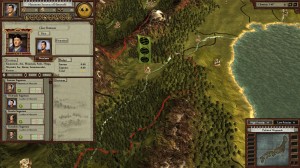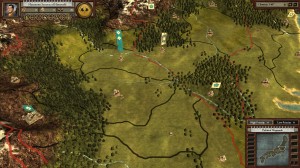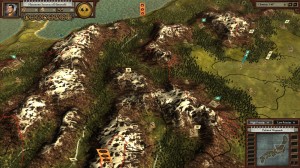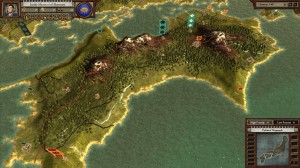We recently took a first look at Sengoku, the newest internally developed game by Paradox Interactive. Sengoku is a Grand Strategy title for the PC set in 15th century Feudal Japan. Since we are very intrigued to hear more about Sengoku and the direction Paradox Interactive is taking with it, we had a chat with Johan Andersson, Producer at Paradox Interactive, and the guy responsible for the project.
Thank you for taking the time to speak with us about Sengoku. Just in case some readers are not familiar, could you tell us a little about the development team behind Sengoku?
The core of the development team have been responsible for multiple games through the years here at Paradox. It is developed by the same people who made games like Crusader Kings, Hearts of Iron and Europa Universalis.
 What influenced you to create a game set in the turbulent Japanese Sengoku period?
What influenced you to create a game set in the turbulent Japanese Sengoku period?
We had always been inspired by Japan, and while working on our most recent games we came up with so many specific ideas we wanted to try out. The Sengoku period is such an interesting part of Japanese history, and we feel that we could make a really good strategy game about it.
The very first thing people tend to say when they see the initial screen shots of Sengoku is that there is a large similarity with Shogun 2: Total War. How do you feel about this comparison, and where do the similarities end?
If there is a game in a similar time-period you will always get comparisons. We make strategygames with a focus on fun and depth on the map, while Total War is usually more focused on good-looking battles.
Could you explain how you go about your research for a game like this? How do you ensure the game is historically accurate and where do you gain your insight on the era?
We have a person on staff at each project to do the research. This involved reading a lot of books, checking sources on the internet, and talking with a lot of people. We also keep a group of people on private discussion groups that can provide information where we can’t find them.
We’re very interested on how you go about sourcing the music and sound effects for a game like Sengoku. For example, will the game feature native Japanese voices?
There will be no voice acting in the game. We never use that in our strategygames, but we have a full hour of music with japanese instruments and style.
One of the really burning questions is whether or not Sengoku will have multiplayer elements. If yes, could you elaborate on how this will work and what players can expect?
The campaign can be played together with up to 32 players playing against each other at the same time. We believe that this game makes for a brilliant multiplayer experience.
In one of the video interviews you’ve released recently, you mentioned that Ninjas will definitely be included. Could you elaborate on how the Ninja will work? What functionality or utility will the Ninja offer to the player?
The game will have ninja clans that you can contract for jobs. Contacting these secretive clans will be done by sending one of your characters on a mission to hire them. These missions you can give to the ninja clans will include (among other things) assasinations, kidnappings or even protection from other ninja clans.
Aside from the Ninja, what other types of units can we expect? We’re obviously going to see Samurai units in our armies, but what about Generals and/or Hero units – or other ‘agents’?
Armies will contain of course contain both Samurais . Since Sengoku is a character-based strategy game, there will be quite a lot of different historical characters that can be used as generals for your armies. All with different abilities that will impact on how well they fill fight for you.
We’re very interested to hear more about the combat. What can we roughly expect?
The combat will be very close to how EU3 handles battles. We aim to focus on a deep game where the focus in strategic decisions instead of tactical battles. What decides the outcome of a battle is still weapons, leadership, terrain, quality of troops and plain luck.
Can we expect siege battles, and if so could you explain what they will involve? For example, can we construct siege weapons?
It works very much like in our previous games. Your units will lay siege to a castle and try to starve its defenders out. How the siege works out depends on things like the skill of your commander, the stats of your troops and what defensive features the defender has constructed. One difference is that troops that the defenders have choosen not to send out on campaign will join the garrison.
Since Japan is a massive island, and contains several small island groups as well, will there be a heavy focus on the naval aspect as well?
No, there will not be any naval warfare, nor any focus on navies and trade.
How in-depth will the diplomacy system be? We’re hoping for Vassals, alliances involving more than 2 clans, marriages, etc. This is an element where Sengoku could really outshine the competition.
Vassal relationships are really the backbone of the game where all relationships are basically defined by this. The Clan leader can have Daimyos as vassals and a daimyos can have Kokujins etc. A weaker clan can also choose to submit as vassals to a larger clan.
When it comes to alliances we have chosen not to have permanent alliances. In this game it’s all about competition for the ultimate power, there is no room for cooperative victory. Clans can work together of course, for example by non-aggression pacts and the exchange of hostages, or as I mentioned earlier weaker clans can temporarily submit as vassals.
Similar to the above, what can we expect in terms of the trade system and economy model? What are the primary methods of generating income for the player?
You get tax from your provinces, and you can build up buildings in the province which increase your income. Of course, these buildings may be destroyed by hostile armies.
Last but not least – are there any features you are particularly proud of and haven’t been able to share yet? What about features you are considering but aren’t sure about in terms of whether or not they are realistic?
Currently all features we thought about are in the game, so we can’t really answer which ones we aren’t sure about that easily. For what we are are most proud of, that’s hard to say, but my current favorite feature is the interaction with the three religious factions.
Thank you very much for your time, it was an absolute pleasure!
Thank you for giving us the opportunity to talk about the game. We hope you will enjoy it.



